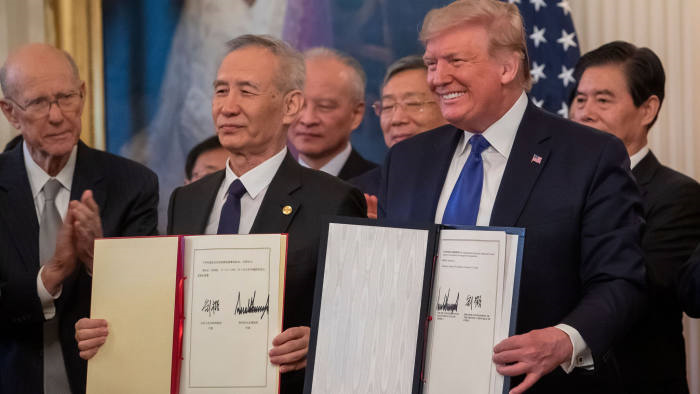On January 15th, US President Donald Trump and Chinese Vice Premier Liu He signed the Phase One Trade Agreement with China.
https://twitter.com/WhiteHouse/status/1217489267909246981?s=20
Trump said that relations with China “have never been better” and that “it’s the best it has ever been.”
https://twitter.com/markknoller/status/1217521453526081536
Trump said: “Today, we are taking a momentous step towards a future of fair and reciprocal trade. Together we are righting the wrong of the past.”
“At long last Americans have a government that puts them first at the negotiating table,” he said. “This is the biggest deal anybody has ever seen.”
In attendance at the signing ceremony were Henry Kissinger, and media and business leaders including Stephen Schwarzman, the chairman of Blackstone, and Ajay Banga, the president of Mastercard, in addition to almost every member of the Trump cabinet.
The first phase of the deal will further open the Chinese market to US companies, and includes roughly $200bn in Chinese purchases of American goods and services.
Separate into categories, this is what China pledged to purchase:
- Manufacturing goods: at least $32.9bn more in 2020, rising to $44.8bn more in 2021
- Agricultural products: at least $12.5bn more in 2020, rising to $19.5bn in 2021.
- Energy products: at least $18.5bn more in 2020, rising to $33.9bn in 2021
- Services: at least $12.8bn more in 2020, rising to $25.1 in 2021
https://twitter.com/byHeatherLong/status/1217508501410500609
What remains is most of the $360bn worth of tariffs that the US has already imposed on Chinese goods, and the threat of additional punishment if Beijing does not live up to the terms of the deal.
But there is skepticism about the deal, and most experts consider it that a full-fledged trade war is brewing and that the deal doesn’t really do anything to stop it.
Nick Marro, an analyst at The Economist Intelligence Unit expressed his concerns at the deal. He considers that China may not be able to live up to its pledge to purchase $200bn worth more of US goods, and even if it does, the deal only lasts until 2022.
Tim Drayson, Head of Economics at Legal & General Investment Management (LGIM) was also skeptical of the deal.
“First, the majority of the existing tariffs remain in place, with no timetable for their removal. Second, it will be difficult for China to meet its target for purchases of US goods.
Third, the deal lacks a credible enforcement mechanism. Finally, progress on the key structural issues remain extremely limited.”
Separately, trade relations between the US and the EU are also complicated.
The Trump administration is weighing whether to impose tariffs on $2.4 billion in French products. The United States has argued that France’s tax, which affects large American tech firms such as Facebook and Google, represents a barrier to trade.
The Trump administration imposed a 25% tariff on most European wine in October, in retaliation for government subsidies received by planemaker Airbus.
Brexit is also nearing on January 31st, and the UK is sure to seek a trade deal with the EU, and that would also be a difficult negotiation. Thus, a promise of a trade war, with not only the US on one side, and China on the other is not completely unlikely.
MORE ON THE TOPIC:





What Trump will do next is to tell the businessmen to overprice China, since they have to buy certain amount of goods from the US. That’s why Trump keeps sanctions up. Because China will certainly refuse to buy overpriced US goods. I think Chinese strategy to gain time up to the end of 2020 when there is elections for Trump, so choke US economy by refusing any trade deal at that time to prevent Trump getting re-elected.
China took the biggest hit in this war at the beginning but the longer it goes on the harder the impact on the USA and the cart will eventually tip
If China implemented a rare earth mineral ban on USA it would amount to not only tipping the cart but shooting the horse as well.
Trump has put himself over a barrel, the big stick threat of tariffs didn’t work against China and now the dispute has dragged on into 2020 the poker stakes just got very big for Trump. He bluffed and bullied using the size of his playing stack but China didn’t fold now an election is looming over the horizon China holds all the aces!
Trump the swamp!
Oh Gee,
the Trump is swamped !
Orange poodle chaises Chinese noodle,
Tariff that shit
and print $$$ EXIT!
What great Zio-plan to go to Iran.
Goyim track,
for never returning back.
Nothing special…China will buy 200bm of US goods who had stopped buying…and USA will stop 200bm in Tariff of China goods…even that the superavit ( surplus in trade) is about 500Bm favorable to China.
Trade wars are ultimately about hegemony. Historically, power struggles always move to the battlefield. Military confrontation between China and the US will be world war.
https://www.ghostsofhistory.wordpress.com/